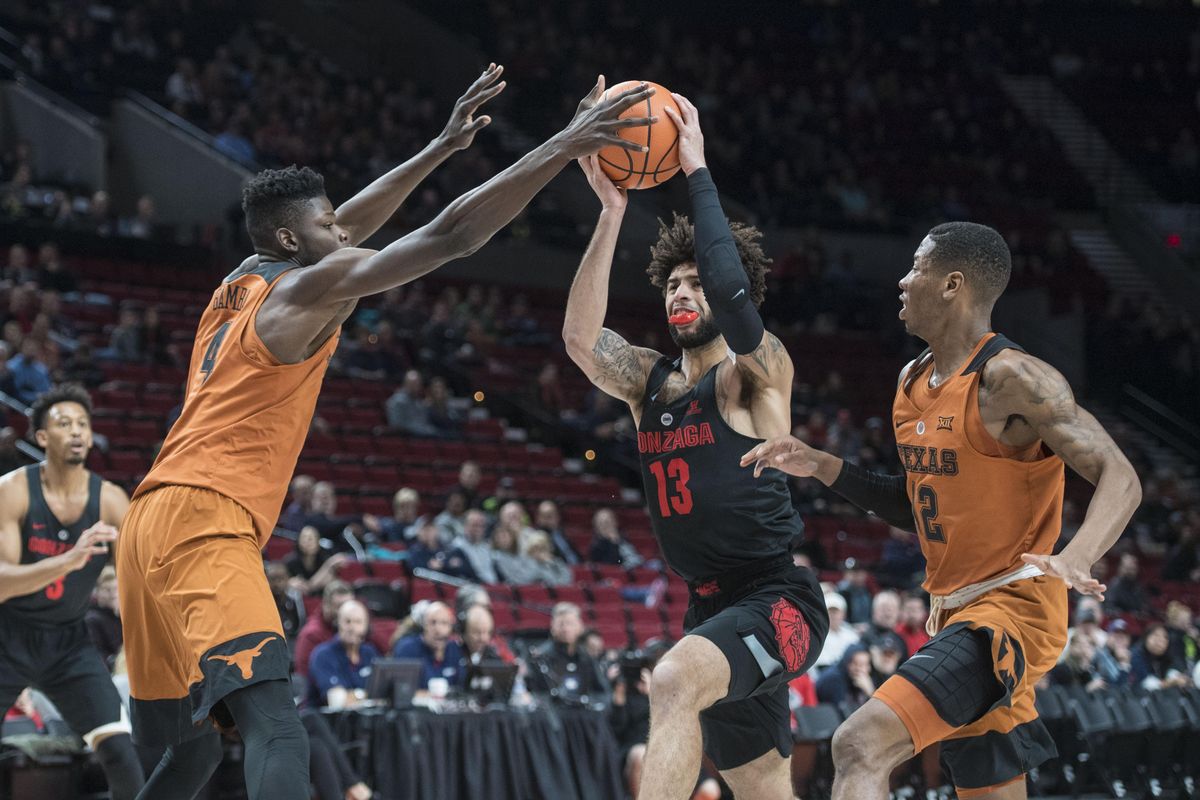TV Take: Pressure got to Zags but not in end

If you were wondering how Gonzaga would handle pressure after the graduation of All-American point guard Nigel Williams-Goss, you received an answer Sunday.
It was, simply, not well. But well enough.
At least it was against Texas in the Zags’ 76-71 overtime win over the Longhorns in the PK80 Invitational for third place in the Motion bracket.
The Bulldogs led by 21 at one point in the second half and all we heard was well-earned praise from the ESPN broadcast team of Dan Shulman and analyst Jay Bilas.
But as the Longhorns (4-2) outscored Gonzaga 15-4 in the final 2 minutes, 58 seconds, Bilas was incredulous at the turnovers.
As was GU coach Mark Few, who showed his emotions on the sidelines. And, more than likely, the Zags fans watching at home.
What they saw …
As Gonzaga turned it over time after time in the closing minutes, Bilas was amazed how poorly Josh Perkins and Silas Melson were handling Texas’ frantic defense. And he wasn’t shy about saying so.
“If you can’t handle pressure better than this you will be inviting it all year,” he said.
“This is very good pressure by Texas but,” Bilas continued, “Gonzaga has not been strong with the ball.”
And the Zags got weaker.
Leading by five with 17 seconds left in regulation, they yielded a follow dunk to Mohamed Bamba, which cut the lead to 67-64 with six seconds left.
Perkins took the ball out of bounds, looked around, couldn’t find anyone open and threw it away, right to Dylan Osetkowski in the back court. A quick pass later and Texas’ Andrew Jones drilled a 3-pointer to send it to overtime.
“Josh Perkins has had so many problems trying to deal with the size of Texas in inbounding,” Bilas said, referring to the 6-foot-11 freshman Bamba, who was guarding the ball in the Longhorns’ press. “And throwing that long pass couldn’t have been a worse decision.”
It was one of many for GU, which had 24 turnovers, the most since 2010 according to Shulman.
“Gonzaga did not handle pressure well at all,” Bilas noted after praising Texas’ frantic comeback. “Coughed the ball up, coughed the ball up for touchdowns, then at the end, with a three-point lead, you are better off eating the ball.”
What we saw …
Things you may or may not know about Jay Bilas.
He grew up and was a high school star in Southern California. He was an All-American at Duke. He’s not a big fan of the NCAA. And he is a big fan of the Gonzaga basketball program.
That came through clearly – oh, here’s another thing: Bilas is clear and concise as a basketball analyst – as he shared his knowledge of Gonzaga’s past on the ESPN morning broadcast. And he also knows the current Zags as well as anyone on the national broadcast scene.
“This team is picked second in its league,” Bilas asked as Gonzaga was in the midst of a 24-0 first-half run that gave the Zags the lead and what turned-out to be much-needed breathing room.
“That’s like putting Kansas second in the Big 12. On what evidence do we have that someone is going to beat Gonzaga in the West Coast Conference?”
But as they wilted under pressure, Bilas asked good questions. And when the Zags rallied in overtime, he answered some of them himself.
Before that, however, he and Shulman spent much of the broadcast time talking about the play of sophomore wing Rui Hachimura.
“This may be the game where we look back and ‘that’s when Hachimura really showed up on the national stage,” Shulman opined midway through the second half.
Why not? Hachimura had a career-high 20 points and nine rebounds, matching up well with Texas’ athletic front court.
That helped take up some slack from Johnathan Williams. The senior, after scoring a career-high 39 against Florida, had just 10 against the Longhorns, though four of them came late when Gonzaga was having trouble scoring.
A Melson 3-pointer at the end of the shot clock in regulation, a Melson steal and layup in overtime, and an overtime putback by freshman Corey Kispert helped as well.
It was enough to overcome the inability to handle Texas’ pressure. And answered some questions.